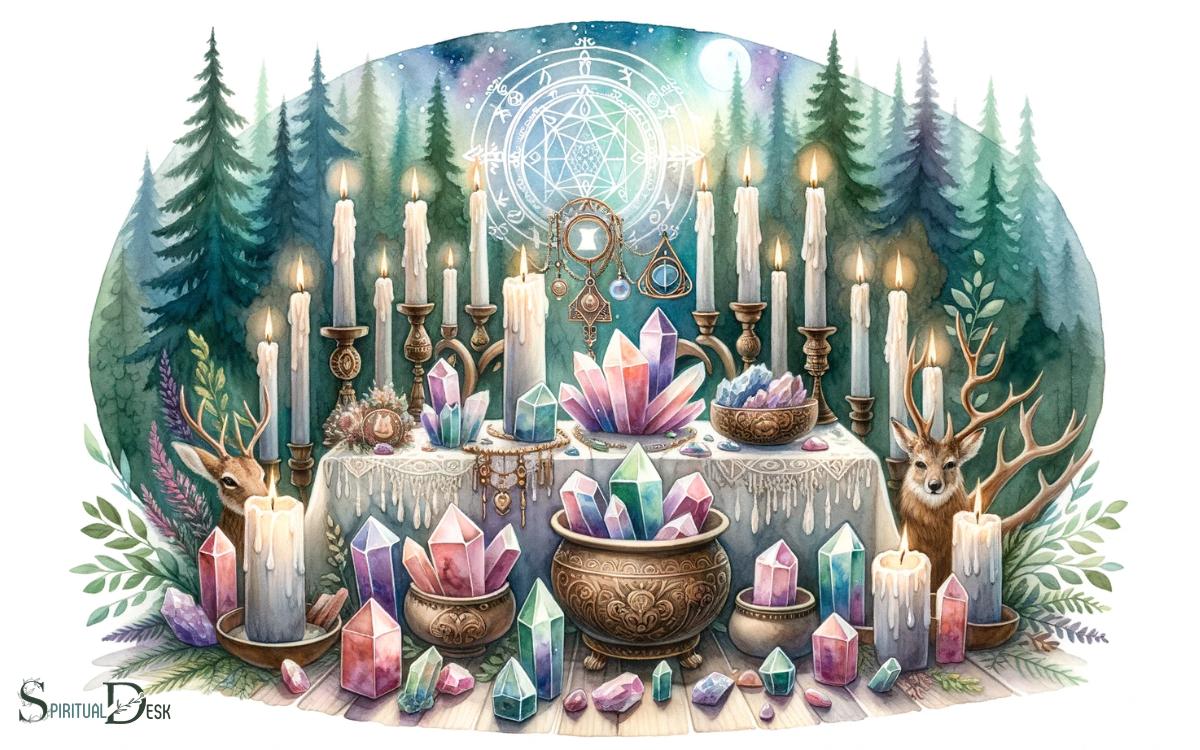What Is the Spiritual Meaning of Altar? Sacred Space!
The spiritual meaning of an altar is a sacred space or structure dedicated to worship, prayer, and offerings, serving as a channel to connect with the divine or higher power.
Altars have been used in various spiritual and religious traditions throughout history. They symbolize a place of reverence, devotion, and connection with the spiritual realm.
In some belief systems, altars can be permanent fixtures in holy places, such as churches or temples, while in others, they can be temporary or personal spaces set up in one’s home.
The purpose of an altar is to provide a focal point for spiritual practice, allowing individuals to focus their intentions, energy, and concentration on the divine.
In many cultures, altars are adorned with various symbolic elements such as candles, incense, icons, or religious texts.
These items serve to further enhance the spiritual atmosphere and facilitate the development of a deeper connection with the spiritual realm.
By creating and maintaining a dedicated sacred space, individuals can strengthen their spiritual practice and foster a greater sense of mindfulness and devotion in their daily lives.

Key Takeaway
9 Symbolism Aspects: Spiritual Meaning of Altar
| Aspect | Spiritual Meaning |
|---|---|
| Purpose | An altar serves as a sacred space for ritualistic practices, prayers, and connecting with the divine or spiritual realms. |
| Design | The design of an altar often incorporates symbols, sacred objects, and elements that hold spiritual significance, creating a visually pleasing and energetically balanced space. |
| Placement | The location of an altar is chosen to enhance the spiritual energy flow and create a harmonious atmosphere for spiritual practices. It may be placed in a specific cardinal direction, at the center of a room, or in a dedicated sacred space. |
| Elements | Altars often include a combination of the four elements � earth, air, fire, and water � to represent the interconnectedness of all things in the universe and the balance of energies. |
| Offerings | Offerings are placed on the altar to honor and connect with the divine, spirit guides, or ancestors. These may include food, flowers, incense, candles, or other symbolic items. |
| Intention | The intention behind an altar is to create a space for spiritual growth, healing, and connection with the divine. Setting a clear intention helps to establish the altar as a sacred space and focus the individual’s spiritual practice. |
| Meditation and Prayer | An altar is often used as a focal point for meditation and prayer, allowing individuals to center their thoughts and energy on their spiritual journey and connect with their higher selves. |
| Rituals and Ceremonies | Altars are central to many spiritual rituals and ceremonies, providing a space for offerings, invocations, and the performance of sacred rites. |
| Personalization | An altar can be personalized to reflect the individual’s beliefs, practices, and spiritual path, making it a unique and meaningful expression of their spiritual journey. |
Historical Origins and Evolution
The historical origins and evolution of the spiritual meaning of altars can be traced back to ancient civilizations and religious practices.
Altars have been integral to various religious and spiritual traditions, serving as a focal point for rituals, offerings, and communication with the divine.
- In ancient Mesopotamia, Egypt, Greece, and Rome, altars were central to religious ceremonies and sacrifices, symbolizing a connection between the earthly and spiritual realms.
- In Christianity, altars are considered sacred spaces for communion with God and are used for the Eucharist.
- Similarly, in Hinduism and Buddhism, altars are adorned with offerings and serve as a place for meditation and worship.
The evolution of altars reflects the enduring significance of spirituality and the human quest for transcendence.
Symbolism in Religious Practices
Symbolism in religious practices can be observed across various cultures and belief systems. Altars serve as a central focal point for rituals and spiritual communication.
The use of specific items on altars, such as candles, incense, and sacred texts, often holds deep symbolic meaning.
For example, the lighting of candles can represent illumination and spiritual awareness. The burning of incense is symbolic of purification and the lifting of prayers to the divine.
Additionally, the placement of objects on an altar, such as water, grains, or flowers, can symbolize offerings and gratitude.
The act of arranging these items with intention and reverence adds layers of symbolism to religious practices. It enriches the spiritual experience for practitioners and creates a deeper connection to the divine.
Creating a Sacred Connection
Incorporating personal items and meaningful symbols into the altar fosters a sacred connection, deepening the spiritual experience and strengthening the practitioner�s connection to the divine.
To create a sacred connection with the altar, practitioners can:
- Select Personal Items: Choose items that hold personal significance, such as family heirlooms, photographs, or objects from nature, to infuse the altar with personal energy.
- Use Meaningful Symbols: Incorporate symbols that hold spiritual significance, such as religious icons, crystals, or sacred texts, to enhance the altar�s spiritual power.
- Engage in Rituals: Regularly engage in rituals or practices at the altar, such as meditation, prayer, or offerings, to strengthen the sacred connection and deepen one�s spiritual experience.
By incorporating personal items and meaningful symbols into the altar, individuals can create a sacred space that resonates with their spiritual journey and beliefs, enhancing their connection to the divine.
This sets the stage for the subsequent section about �personal altars and spiritual rituals�.
Personal Altars and Spiritual Rituals
To deepen their spiritual experience and strengthen their connection to the divine, practitioners can establish personal altars and engage in spiritual rituals as a means of fostering a sacred connection.
Personal altars serve as a physical space for individuals to focus their energy and intentions, while spiritual rituals provide a structured framework for connecting with the divine.
Here is an example of how personal altars and spiritual rituals can be incorporated into one�s spiritual practice:
| Personal Altars | Spiritual Rituals |
|---|---|
| – Select a quiet space in your home where you can create your altar. | – Begin by setting aside a specific time each day for your spiritual practice. |
| – Choose meaningful items such as candles, crystals, or religious symbols to place on your altar. | – Light a candle and take a few moments to center yourself and set your intentions for the ritual. |
| – Spend time in quiet reflection or prayer at your altar, focusing on your spiritual goals. | – Engage in prayer, meditation, or other practices that resonate with your spiritual beliefs. |
| – Regularly maintain and update your altar to reflect your evolving spiritual journey. | – Conclude the ritual by expressing gratitude for the divine presence in your life. |
Altars Across Different Cultures
Altars are found in various cultures around the world, serving as significant spiritual and ceremonial spaces.
They vary widely in form, function, and significance, reflecting the diversity of human spiritual expression.
Here are some examples of altars across different cultures:
- Hinduism: In Hindu culture, altars are commonly found in homes and temples. They are adorned with deities, candles, and offerings, and are used for daily worship and ceremonies.
- Christianity: Within the Christian faith, altars hold central importance in churches, symbolizing the presence of God during the Eucharist or Communion. They are often adorned with candles, crosses, and religious symbols.
- Indigenous Cultures: Many indigenous cultures have their own unique altar traditions, often involving natural elements such as rocks, feathers, and herbs, and serving as focal points for spiritual rituals and ceremonies.
Conclusion
The spiritual significance of altars spans various cultures and religious practices. Like a bridge between the physical and spiritual realms, altars serve as a focal point for sacred connections and rituals.
They symbolize unity, reverence, and devotion, offering a space for individuals to commune with the divine and honor their spiritual beliefs.
Altars continue to hold deep spiritual meaning, providing a tangible link to the transcendent and guiding individuals on their spiritual journeys.
FAQ About What Is The Spiritual Meaning Of Altar
What Is An Altar Used For In Spiritual Practice?
An altar is a sacred space for meditation, prayer, and spiritual rituals.
How Do I Create A Spiritual Altar At Home?
Choose a dedicated space, decorate with items that hold spiritual significance, and cleanse with sage or palo santo.
Why Are Candles Commonly Used On Altars?
Candles represent light, clarity, and purity. They also symbolize the eternal flame of the spirit.
What Are Some Common Items Found On A Spiritual Altar?
Crystals, statues of deities, sacred texts, plants, and incense are often found on spiritual altars.
Do Different Spiritual Practices Require Different Altars?
Yes, different practices have their own traditions and symbols. Research what is appropriate for your chosen practice.






